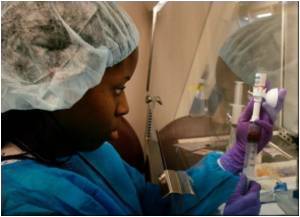A surprising discovery reported by Johns Hopkins investigators about pancreatic cancer is that it develops and spreads very slowly, contrary to what scientists had believed earlier.

"For the first time, we have a quantifiable estimate of the development of pancreatic cancer, and when it would be best to intervene," according to Christine Iacobuzio-Donahue, M.D., Ph.D., associate professor of pathology and oncology at Hopkins' Sol Goldman Pancreatic Cancer Research Center, "so there is potentially a very broad window for screening." Right now, however, she adds, "pretty much everybody is diagnosed after that window has closed."
Pancreatic cancer is notoriously difficult to detect in its early stages because there are frequently few symptoms and current imaging techniques are not specific for cancer.
Bert Vogelstein, M.D., professor and director of the Ludwig Center for Cancer Genetics & Therapeutics at the Johns Hopkins Kimmel Cancer Center and an investigator at the Howard Hughes Medical Institute, says the results show that "many pancreatic cancer cases have a long lag time before they are detected through conventional tests. This leaves room to develop new early, diagnostic tools and intervene with potentially curative surgery."
The Hopkins work, published in the October 28 issue of the journal Nature, suggests that it takes at least a decade for the first cancer-causing mutation that occurs in a cell in a pancreatic lesion to turn into a full-fledged cancer cell. At this point, the lesion is called "high-grade" and should be removed, much like polyps are removed from the colon.
After the first cancer cell appears, it takes an average of nearly seven years for that cell to turn into the billions that make up a cancerous tumor the size of a plum, after which at least one of the cells within the tumor has the potential and ability to spread to other organs. Patients die an average of two and a half years after this metastasis.
Advertisement
For the study, scientists collected tissue samples during autopsies of seven patients who died from pancreatic cancer that had metastasized to other organs. Because the tissue samples were taken within six hours of each patient's death, the scientists were able to keep some of the cells alive long enough to extract the DNA and sequence the series of chemical "letters" that form genes.
Advertisement
They also identified and classified the types of mutations – ones that occur before metastasis and others that happen after the cancer has spread. Both types of mutations were present within the primary tumor years before the metastases became clinically evident, according to Iacobuzio-Donahue.
Using mathematical models to study the timing of pancreatic cancer progression, the scientists conservatively estimated an average of 11.7 years before the first cancer cell develops within a high-grade pancreatic lesion, then an average of 6.8 years as the cancer grows and at least one cell has the potential to spread, and finally, an average of 2.7 years from then until a patient's death.
The Hopkins scientists say the goal is develop a pancreatic cancer screening method similar to the protocol used for breast and colon cancer. Though early stages of pancreatic cancer cause no symptoms, Iacobuzio-Donahue says, perhaps at a certain age people should undergo an endoscopy to screen for pancreatic cancer. Endoscopy is a procedure allowing doctors to look inside the body through the use of an instrument that has a tiny camera attached to a long, thin tube.
Another study published in the same issue of Nature, directed by British researchers at the Wellcome Trust Sanger Institute in collaboration with Iacobuzio-Donahue, used cell lines and tissue samples from the same pancreatic cancer patients as the Johns Hopkins study to look for rearrangements of genetic material. They found more than half of specific rearrangements occurred in all metastases and primary tumors.
Source-Eurekalert















